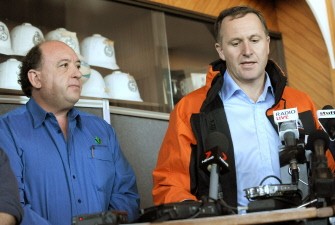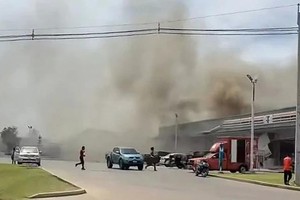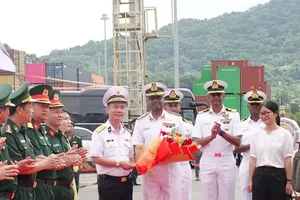GREYMOUTH, New Zealand, Nov 22, 2010 (AFP) - Twenty-nine miners trapped in a New Zealand colliery have "every chance" of surviving, Prime Minister John Key said Monday, as rescuers drilled to the shaft where they are trapped.
As the agonising wait for the missing men entered its fourth day, pressure mounted on rescuers to launch an underground search for survivors of the gas explosion at the Pike River coal mine.

But authorities said the mine remained too dangerous to enter, with tests showing a cocktail of poisonous gases underground that could overcome any would-be rescuers or spark another explosion.
Rescuers hoped to deploy seismic equipment and a remote control robot but the gas was frustrating the launch of any operation.
There has been no contact with the miners since the explosion on Friday afternoon and one of only two men to make it out has told of an extremely powerful blast that blew him off his feet.
It sounded like a "shotgun blast but much, much louder and more powerful," said Daniel Rockhouse, 24, whose brother Ben is still in the mine.
"I got up and there was thick white smoke everywhere -- worse than a fire. I knew straight away that it was carbon monoxide," he told the New Zealand Herald.
Key said he believed that the 29 men could still be alive.
"The advice I have is that there is oxygen in the mine and there is every chance that those miners have managed to get to a pocket of that oxygen flow and therefore that they are alive," Key told Sky News.
"There's no question from the family members I've spoken to that they are feeling extraordinary high levels of fear and anxiety and frustration," Key told a media conference.
"But we owe it to the men underground that in undertaking the rescue we do so in a way that doesn't endanger their lives any further."
Rescuers were drilling a 15-centimetre (six-inch) hole through to the mine shaft, which would be used to take air samples and funnel laser-imaging equipment and video cameras down to give a clearer picture of the situation.
The drilling crew had bored through 100 metres of rock since commencing Sunday and hoped to get through the remaining 62 metres later Monday, Pike River chief executive Peter Whittall said.
A robot provided by the army was also being rushed to the mine, in a remote area on the West Coast of the South Island, but it would have to be modified to ensure it did not ignite gases.
The robot, with a camera, would go into the tunnel about 1.5 kilometres (one mile), over halfway to where the miners are believed to be, "to give us an idea of what we're looking at," said police superintendent Gary Knowles.
But Knowles, who is overseeing the rescue operation, could not say when the robot would be ready.
"As soon as we can get it in there we will, bearing in mind this has to be a safe environment so we don't create another spark... they (the army) are upgrading the robot so it doesn't create a spark."
Grey District mayor Tony Kokshoorn said the region was "in limbo" as they waited to hear the fate of the miners.
The families of the men needed to hear "there is some movement forward," he said.
"Every hour and every day that goes by we have to face the facts that they can't stay down there indefinitely."
Samples of gas conditions in the mine are being taken every half hour and rescuers say they need a sustained downward trend before specialist rescue teams could enter.
Tests have also detected the presence of fire in the mine but it was not known if it was affecting safe areas where the rescuers hoped the miners were sheltering with compressed air and water supplies.
Police have released the names of the 29 men but Knowles said whether they had survived the blast remained the "six million dollar question".
Knowles said American specialists they had spoken to suggested using seismic equipment to listen on top of the ground for any movement in the mine and "we will be, if possible, deploying that equipment".
Australian miner Brant Webb, who survived two weeks trapped underground at the Beaconsfield mine in 2006, told families to "never give up hope".
"The people upstairs have got time to think constantly about their loved ones... it's a really hard waiting game," he said.
























